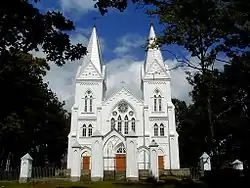baznīca
See also: baznīcā
Latvian

Baznīca (1)
Etymology
Borrowed from Old East Slavic божьница (božĭnica, “church, capel”), probably specifically from the dialectal form бозьница (bozĭnica) (compare Proto-Slavic *božьnica, Belarusian бажніца (bažnica, “shelf with icons; house of prayer”), ultimately from Proto-Slavic *bogъ (“god”) or *božьnъ (“divine”). The first vowel a (< *o) suggests that the borrowing occurred at some point in the 13th century, although the term itself is first mentioned only in the 16th century (as baznedce and baznice; the modern form baznīca is first attested in 17th-century sources).[1]
Pronunciation
- IPA(key): [baznìːtsa]
| (file) |
Noun
baznīca f (4th declension)
- church (building used for worship by Christians)
- baznīcas zvans, tornis ― church bell, tower
- iet baznīcā ― to go to church
- es skatījos baznīcas baltajā tornī ― I looked at the white church tower
- netālajā Annas baznīcā sāka dūkt ērģeles... lauku draudze dziedāja beigu dziesmu ― in the nearby Anna church the organs began to play... the local congregation began to sing the last song
- church (organization of Christian believers belonging to one denomination)
- luterāņu, katoļu, anglikāņu baznīca ― the Lutheran, the Catholic, the Anglican church
- pareizticīgo baznīca ― the Orthodox church
- kristīgās baznīcas vēsture ― the history of the Christian church
- katoļu baznīcas cīņa pret reformāciju ― the fight of the Catholic church against reformation
- (usually singular) church (the set of religious groups and institutions in a country)
- šķirt baznīcu no valsts ― to separate church from state
Declension
Declension of baznīca (4th declension)
| singular (vienskaitlis) | plural (daudzskaitlis) | |
|---|---|---|
| nominative (nominatīvs) | baznīca | baznīcas |
| accusative (akuzatīvs) | baznīcu | baznīcas |
| genitive (ģenitīvs) | baznīcas | baznīcu |
| dative (datīvs) | baznīcai | baznīcām |
| instrumental (instrumentālis) | baznīcu | baznīcām |
| locative (lokatīvs) | baznīcā | baznīcās |
| vocative (vokatīvs) | baznīca | baznīcas |
References
- Karulis, Konstantīns (1992) “baznīca”, in Latviešu Etimoloģijas Vārdnīca (in Latvian), Rīga: AVOTS, →ISBN
This article is issued from Wiktionary. The text is licensed under Creative Commons - Attribution - Sharealike. Additional terms may apply for the media files.